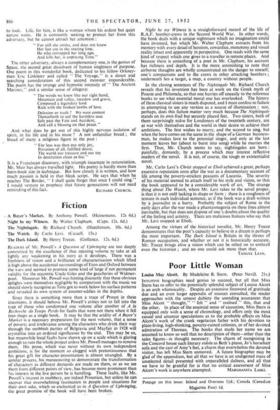Fiction
The Dark Island. By Henry Treece. (Gollancz. 12s. 6d.) READERS of Mr. Powell's A Question of Upbringing are too deeply committed by the excellence of that opening volume to take at all lightly any weakening in his story as it develops. There was a freshness of vision and a brilliance of characterisation which lifted it high above the accidental surroundings of Eton and Oxford between the wars and seemed to promise some kind of large if not permanent validity for the eccentric Uncle Giles and the gaucheries of Widmer- pool. Moreover Mr. Powell was hinting discreetly that these obvious delights were themselves negligible by comparison with the music we should slowly recognise as Time got to work below his surface patterns and revealed its own system of counter-eddies in the depths.
Since there is something more than a trace of Proust in these intentions, it should behove Mr. Powell's critics not to fall into the trap of those who condemned one volume after another of A la Recherche du Temps Perdu for faults that were not there when it fell into shape as a single book. It may be that the aridity of A Buyer's Market is a necessary preparation for the next volume, that a sense of poverty and irrelevance among the characters who drink their way through the snobbish parties of Belgravia and Mayfair in 1928 will crystallise into an ordered significance by the end. This may be so, but meanwhile local faults have shown up on a scale which is glaring enough to ruin the whole project unless Mr. Powell manages to remove them. His prose, which was never without its own independent ambitions, is for the moment so clogged with pretentiousness that his great gift for character-presentation is almost strangled. By a similar process, his manoeuvring to demonstrate the transformation of characters as different demands are made on them, or as we see them from different points of view, has become more prominent than his interest in the live person he is handling. These faults, like Mr. Powell's interest in snobbery, are indeed Proustian, but unless he can recover that overwhelming fascination in people and situations for their own sake, which so enchanted us in A Question of Upbringing, the great promise of The book will have been broken. Night be my Witness is a straightforward record of the life of R.A.F. bomber-crews in the Second World War. In other words, the book deals with a unique nightmare which no imagination could have invented, but which Mr. Walter Clapham extracts from his memory with every detail of heroism, cowardice, monotony and visual reality intact and apparently in perspective. One reads with the same kind of respect which one gives to a traveller in remote places. And because there is something of a poet in Mr. Clapham, his account has richness and depth. It is the more astonishing to note that airborne thoughts are wholly concentrated on the danger to oneself, one's companions and to the crews in other attacking bombers ; underneath lies a target, a map, a country without people.
In the closing sentences of The Nightingale Mr. Richard Church reveals that his invention has been at work on the Greek myth of Procne and Philomela, so that one hurries off uneasily to the reference books to see what essential moral one has overlooked. The history of these classical sisters is much disputed, and I must confess to failure in attempting to use any version as a source of illumination ; nor, perhaps, does this failure matter very much because The Nightingale stands on its own frail but securely placed feet. Two sisters, both of them surprisingly naive for Londoners of the twentieth century, are at war with themselves and the world in their desire to achieve their ambitions. The first wishes to marry, and the second to sing, but when the hero comes on the scene in the shape of a German business- man, he makes love to the potential singer, and only at the last moment leaves her (about to burst into song) while he marries the first. Thus, Mr. Church seems to say, nightingales are born : painfully, demurely, by a process which may interest reflective readers of the novel. It is not, of course, the tough or existentialist novel.
Mr. Carlo Levi's Christ stopped at Eboli achieved a great, perhaps excessive reputation soon after the war as a documentary account of life among the poverty-stricken peasants of Lucania. The severity of his material seemed to attach itself to his style and vision, so that the book appeared to be a considerable work of art. The strange thing about The Watch, where Mr. Levi takes to the novel proper, is that it is not only lacking in shape or form ; there is a roughness of texture in each individual sentence, as if the book was a draft written by a journalist in a hurry. Probably the subject of Rome in the early days after the war made a phantasmagoria on these lines almost inevitable, but that does not dispose of one's doubts about the quality of the feeling and artistry. There are malicious Italians who say that Mr. Levi stopped at Eboli.
Among the virtues of the historical novelist, Mr. Henry Treece demonstrates that the poet's capacity to believe in a dream is perhaps the most important. The Dark Island is Britain in the throes of Roman occupation, and whether or not it is historically accurate, Mr. Treece brings alive a vision which can be relied on to enthrall even the historian ; and no one could ask more than that.
TANGYE LEAN.


































 Previous page
Previous page